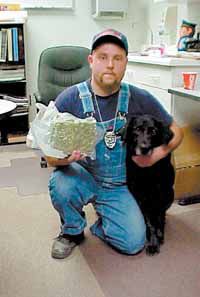| Helper city law enforcement department’s new K-9 drug dog, Brooke, and Police Officer Lynn Archuleta display a bag of suspected marijuana seized by authorities following a March 28 traffic stop on U.S. Highway 6. |
Helper’s new drug canine, Brooke, got the dog’s first test with the city police department during an investigation conducted near Sally Mauro Elementary School.
According to Helper Police Chief George Zamantakis, the K-9 animal definitely passed the test.
Brooke, a 4-year-old black lab, was acquired last month from the Salt Lake County Sheriff’s Department with funding from Helper businesses.
When an anonymous complaint of a female purportedly trafficking illicit drugs in the area was received by the Helper City Police Department on the evening of March 28, Brooke’s skills were put into use during the investigation
Police Officer Trent Anderson observed the suspected vehicle in Helper at approximately 6:30 p.m. on Sunday and pulled the female driver over for an alleged speeding traffic violation.
Following the traffic stop, Brooke and Police Officer Lynn Archuleta were asked to respond to the scene.
The three proceeded to conduct an exterior sniff on the vehicle when Brooke reportedly hit on the driver’s side door.
With the indication from the dog, the law enforcement officers were given probable cause to search the vehicle.
Consent to search the vehicle was also apparently given by the female motorist operating the car, under the condition that the officers focus only the driver’s seat area.
According to the police department’s incident report, Archuleta and Anderson detected the smell of suspected raw marijuana inside the vehicle.
Consent to search the entire car, which Zamantakis said was not required for the law enforcement officers to proceed, was apparently denied by the driver of the automobile.
The Helper police officers proceeded with the search and purportedly found three pounds of suspected marijuana inside vacuum packed bags behind the passenger seat on the floor of the vehicle.
Spring Glen resident Malia Theorine, are 23, was subsequently placed under arrest for unlawful possession of/with intent to distribute a controlled substance in a drug-free zone.
Drug-free zones are defined as any school, park, public lot, house of worship, shopping mall, sports facility or movie house.
State statute elevates all drug offenses by one degree when committed in or within 1,000 feet of any drug-free zone.
Because Theorine was within 1,000 feet of Sally Mauro, the charges were enhanced from a third degree to a second degree felony offense.
Zamantakis said the state law is designed to help protect children from illegal drug activity.
“Our children can be innocent victims of those crimes,” pointed out the Helper police chief. “We are strict with enforcing the enhancement of violations in drug free zones.”
The suspected marijuana, which had an estimated street value of $9,600, was confiscated at the scene and sent to the state crime laboratory for analysis, confirmed the Helper police chief.
Zamantakis said the incident was a prime example of the need for the community and law enforcement to cooperate and address the drug problems that exist in Carbon County.
“The community can’t fight crime alone and the police can’t, either,” stated the Helper police chief. “We have to work together.”
In addition to the suspected controlled substance, $236 was found in the vehicle and taken into evidence by the investigating officers.
The Carbon County Attorney’s Office is currently checking into the possible forfeiture of the money confiscated by the officers, indicated Zamantakis.
With the signing of Senate Bill 175 by Gov. Olene Walker, Utah’s forfeiture laws will revert back to funding various elements of law enforcement instead of going into the state’s public education coffers.
Zamantakis said the old bill filtered the money into federal control and the revenues did not usually make it into the state’s education system.
The recently approved bill “repeals the provision for depositing forfeiture proceeds in the uniform school fund and creates a restricted account for specified state forfeiture funds [and] provides that funds in the account shall be appropriated to the Commission on Criminal and Juvenile Justice.”
While the Helper law enforcement department agrees that education needs more funding, the officers are in favor of the changes to the bill, noted the city’s police chief.
“We supported Senate Bill 175. We believe education needs additional money for our children but these people should pay for our services for the crimes they’re committing,” concluded Zamantakis.

